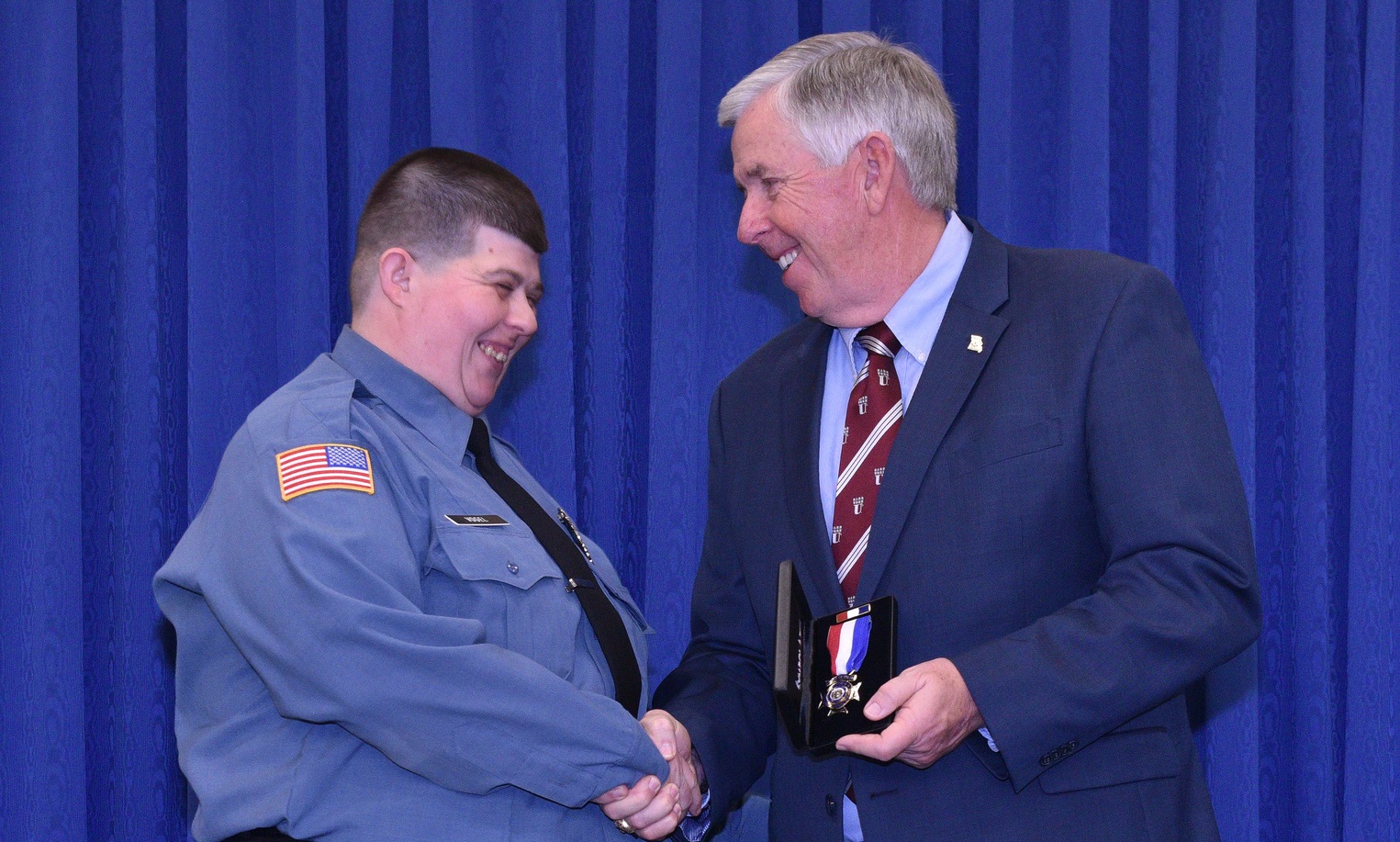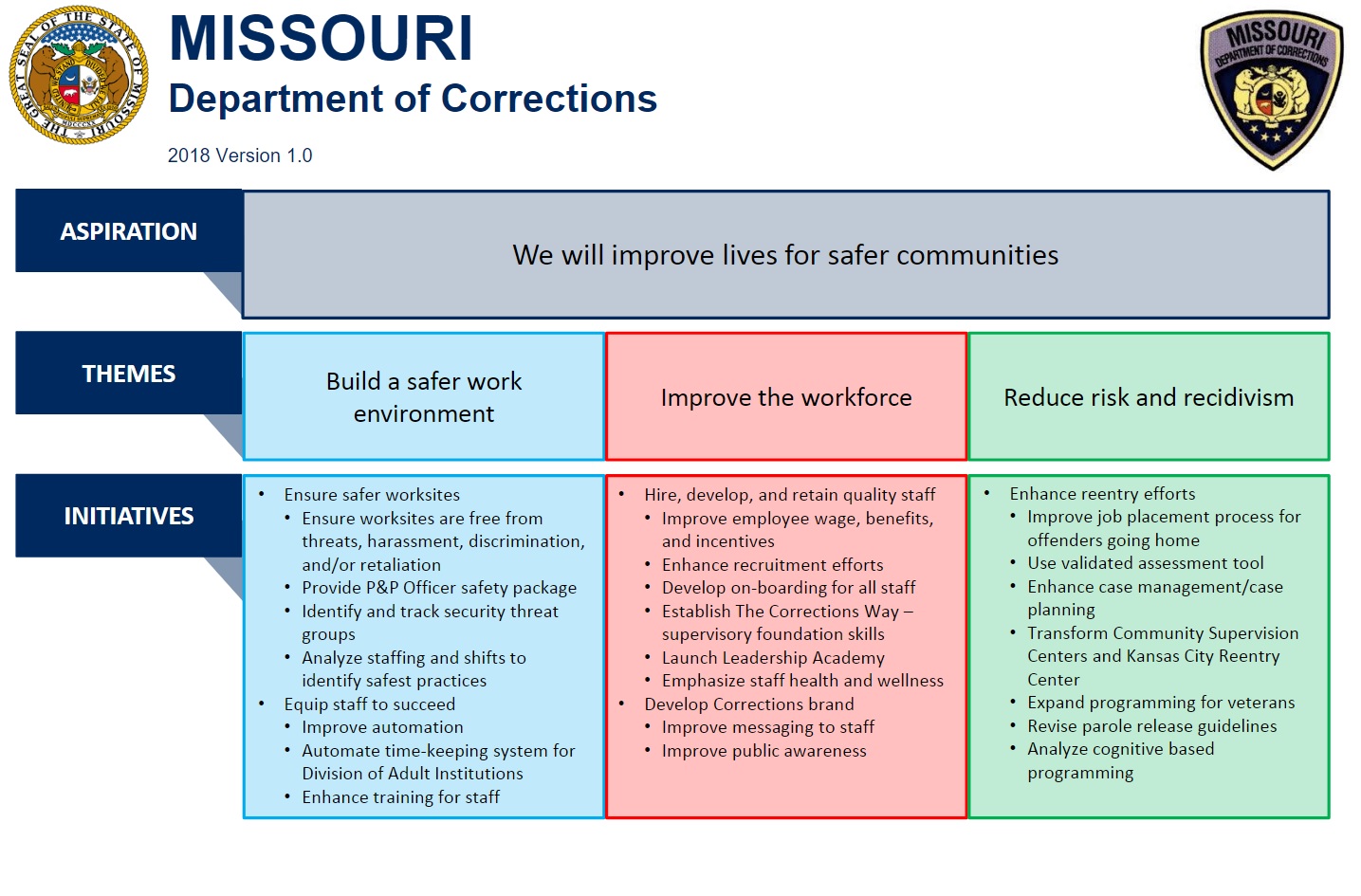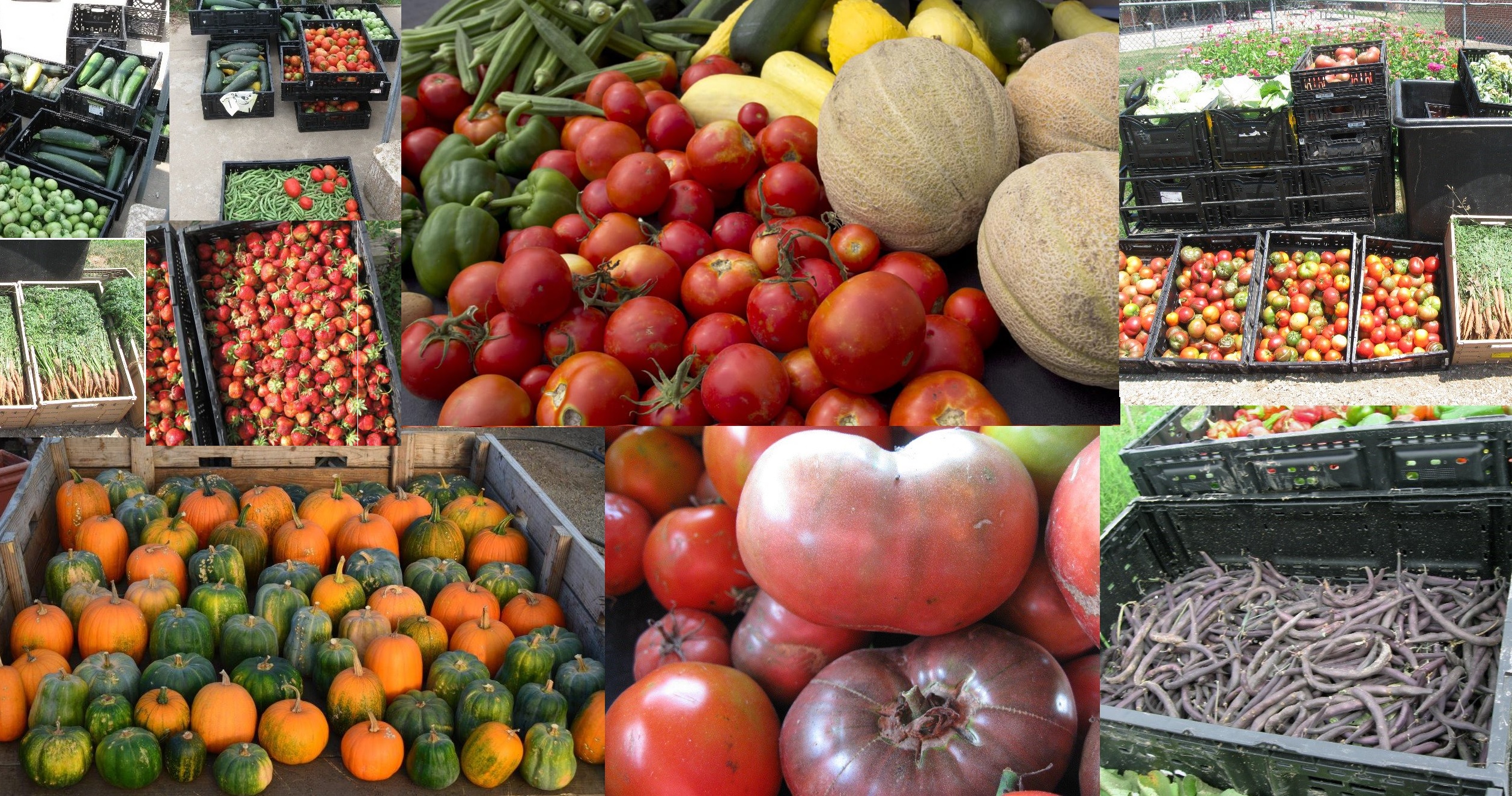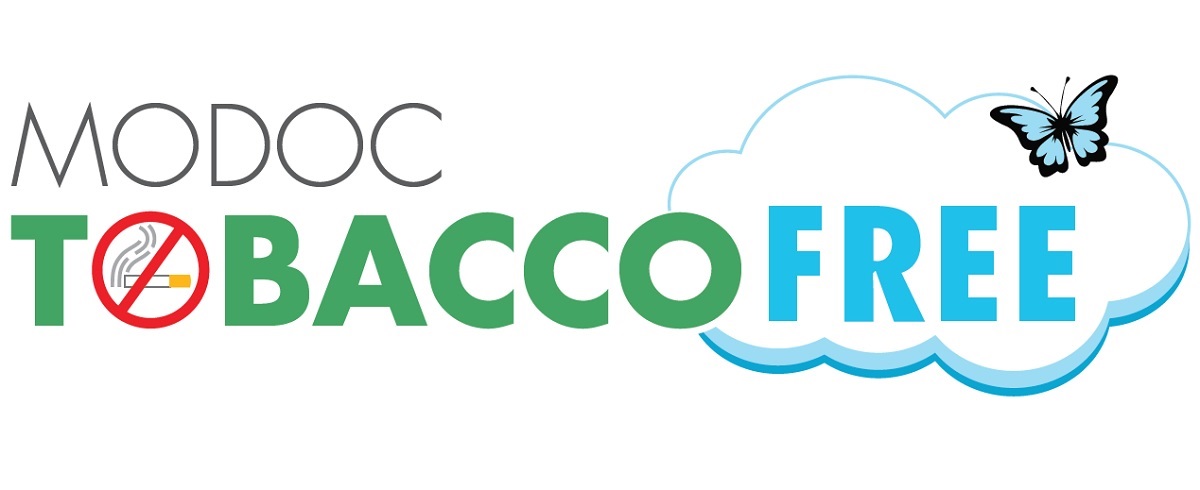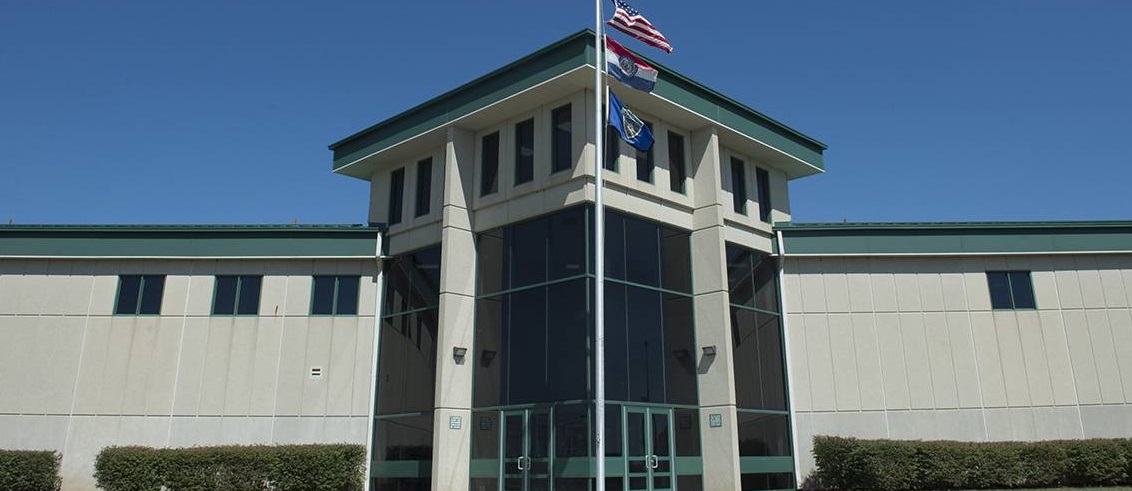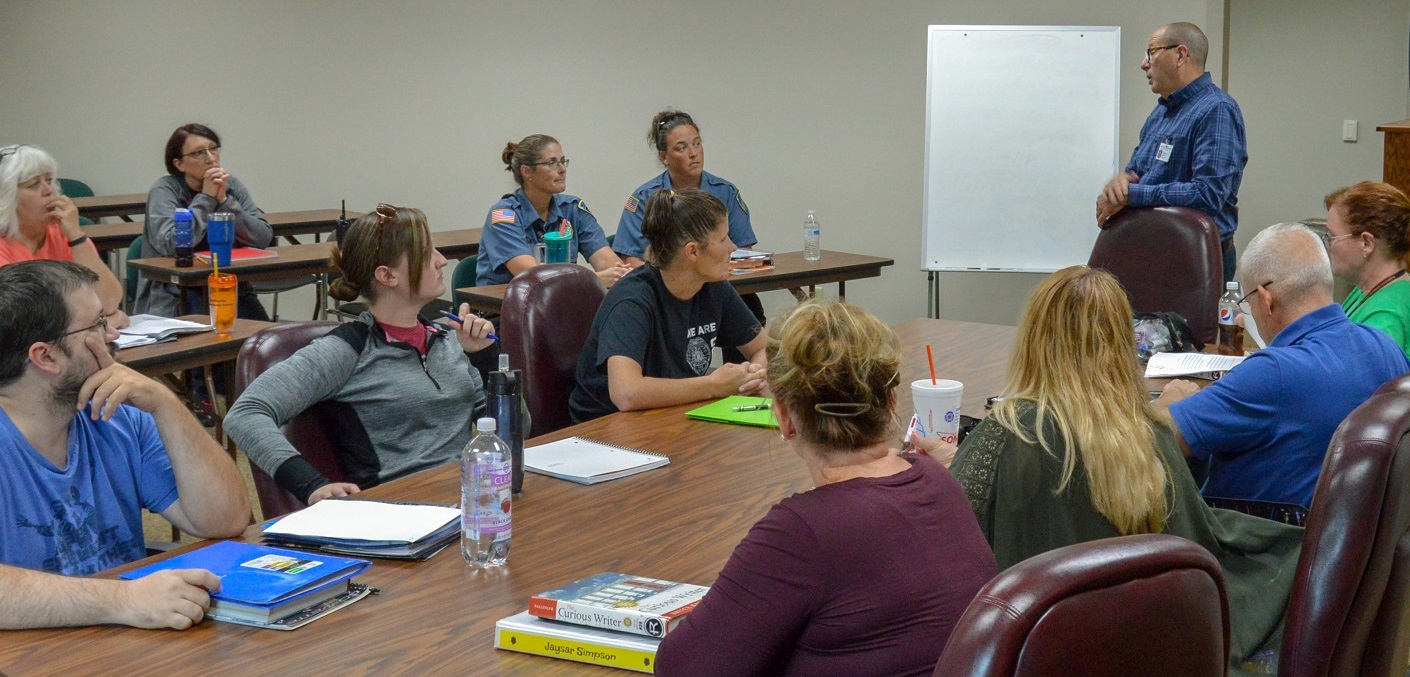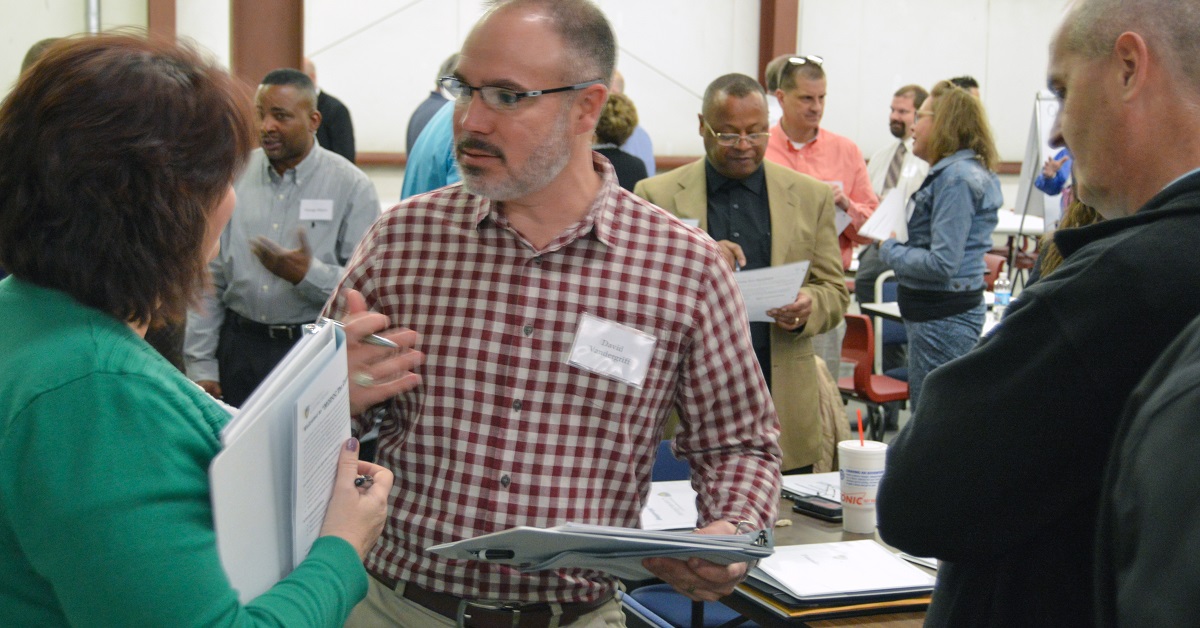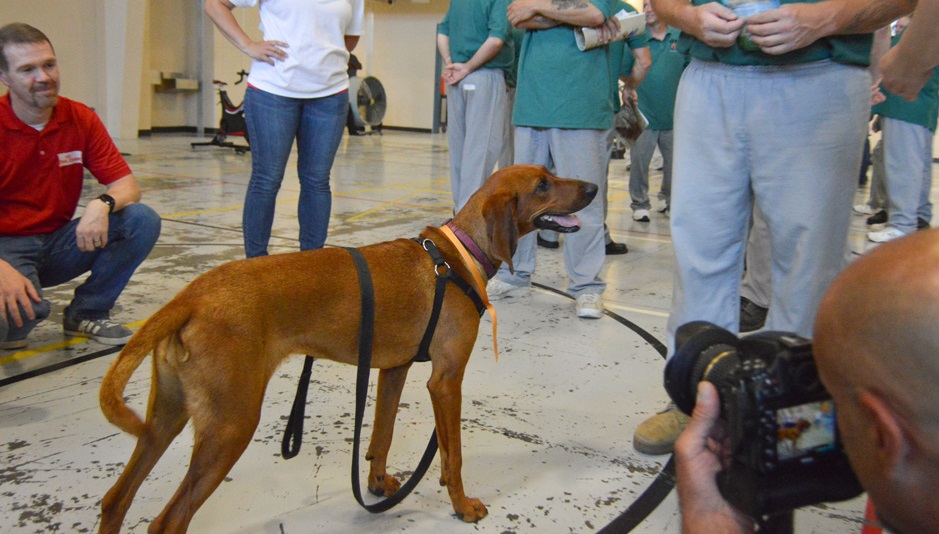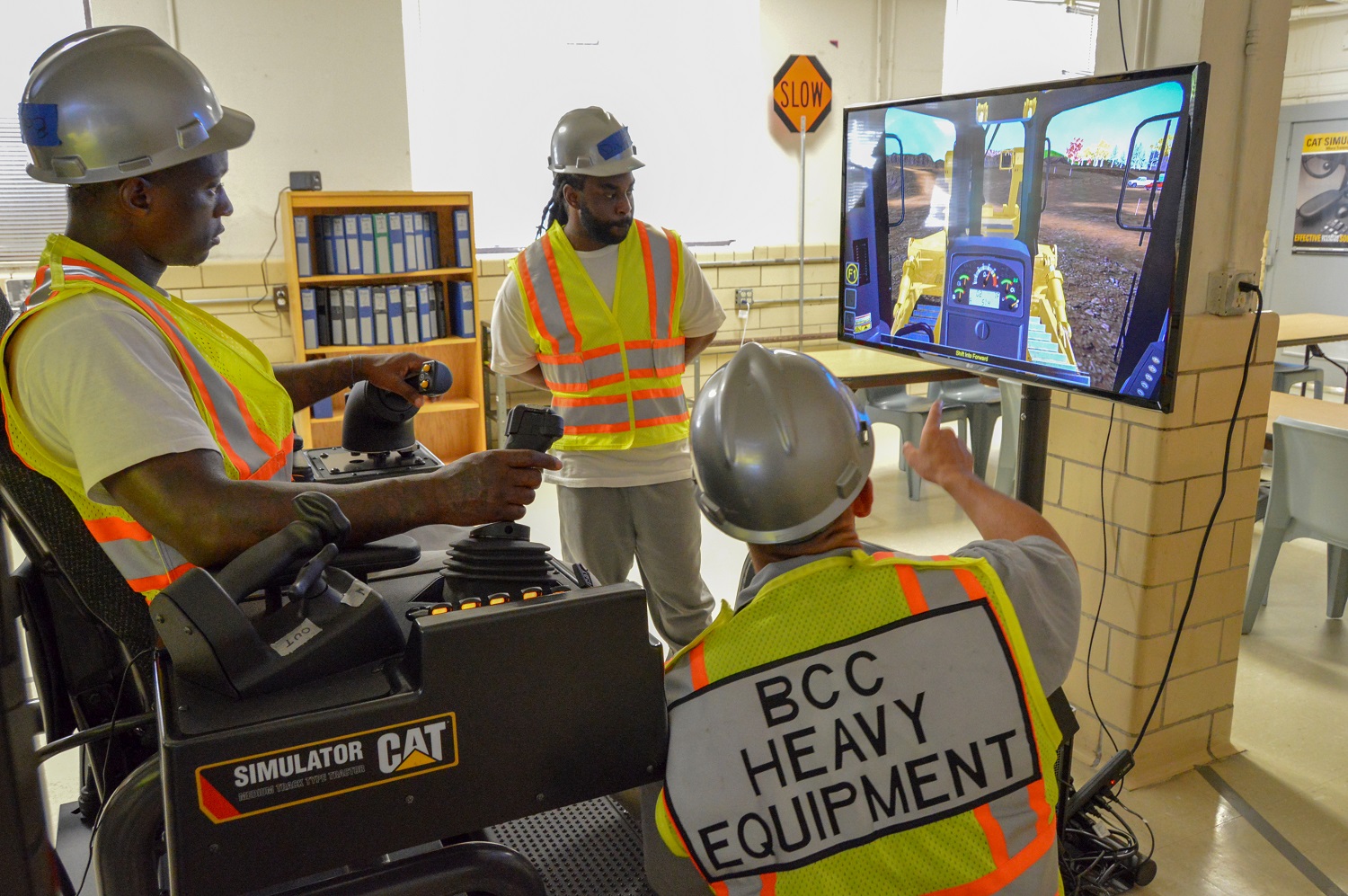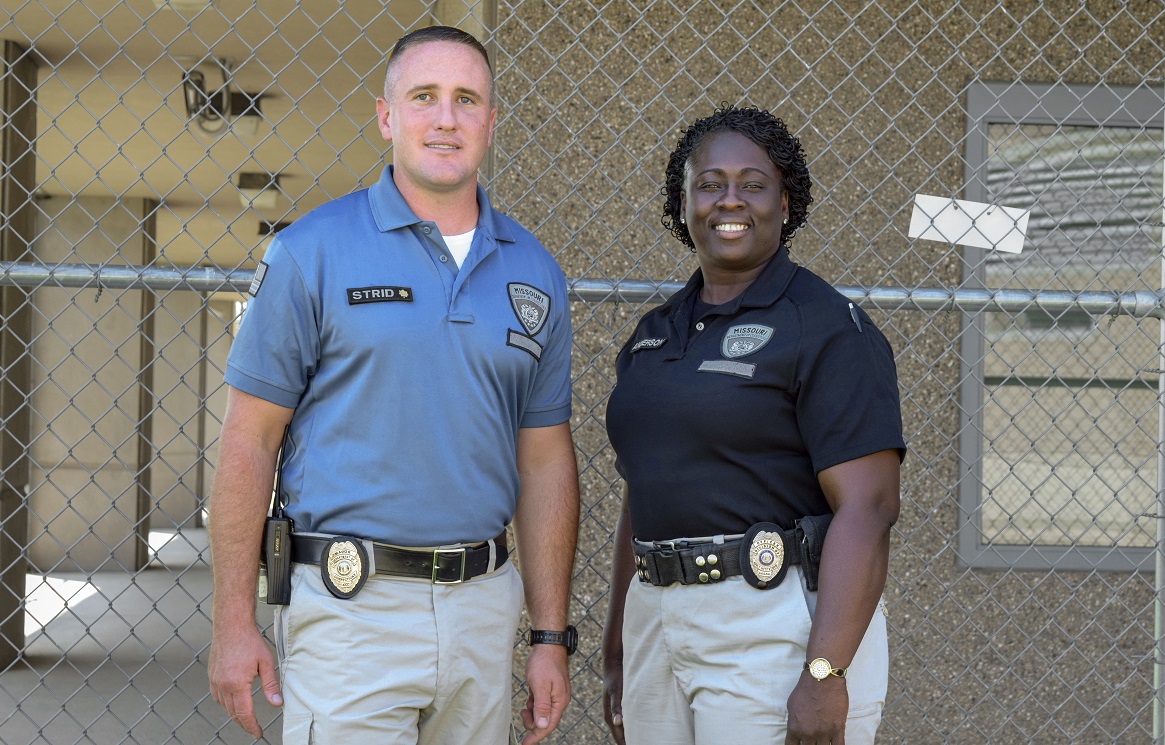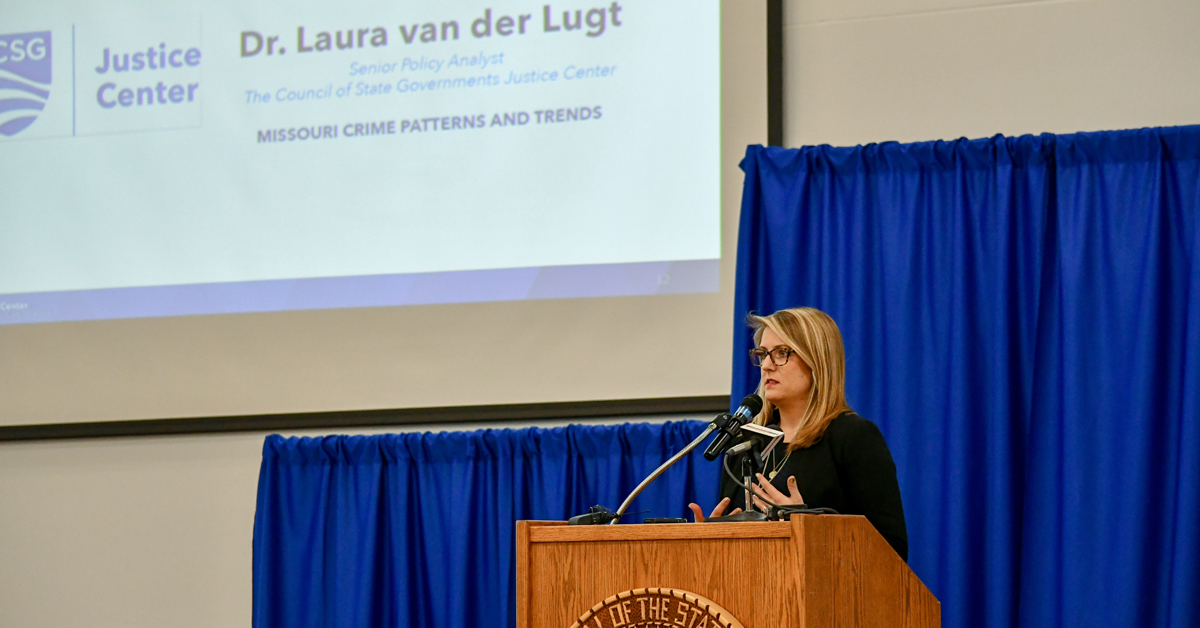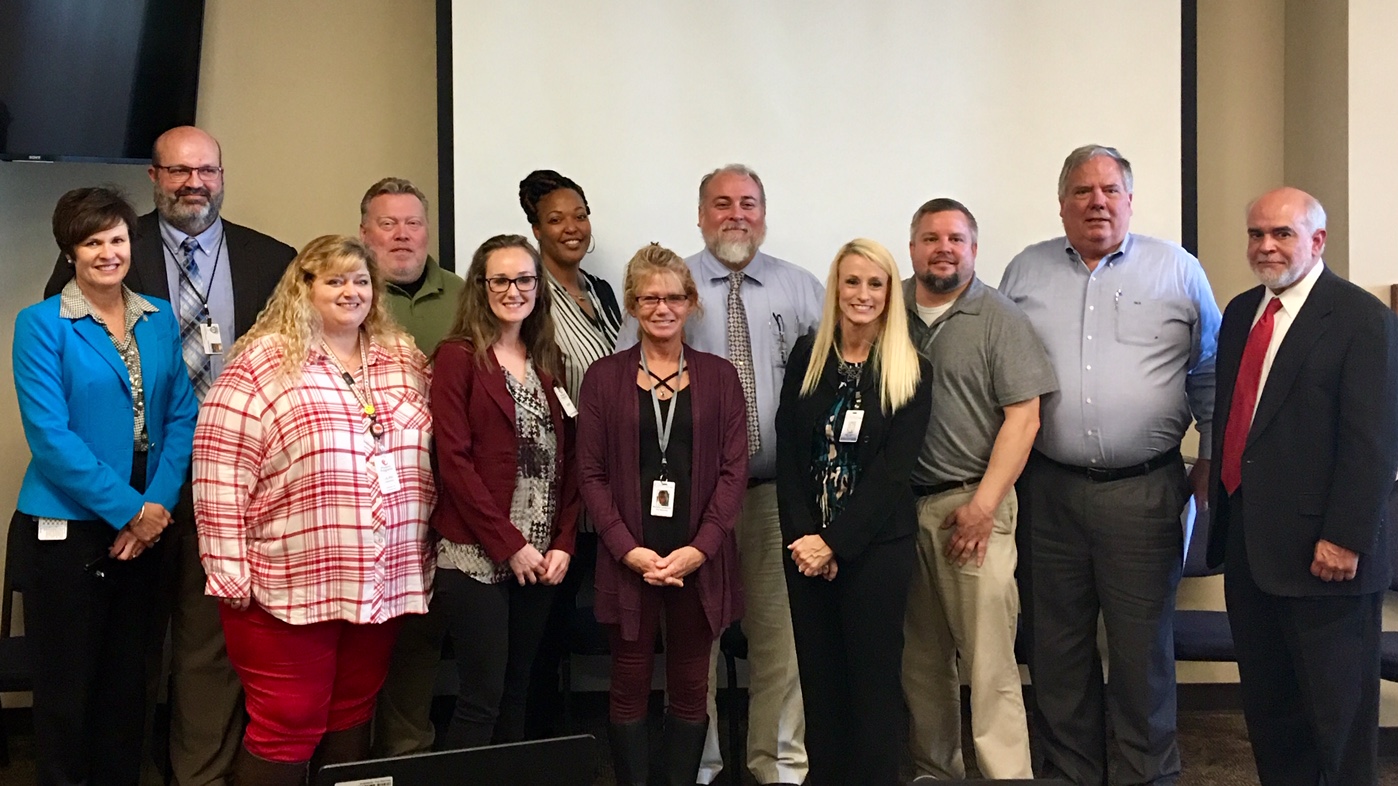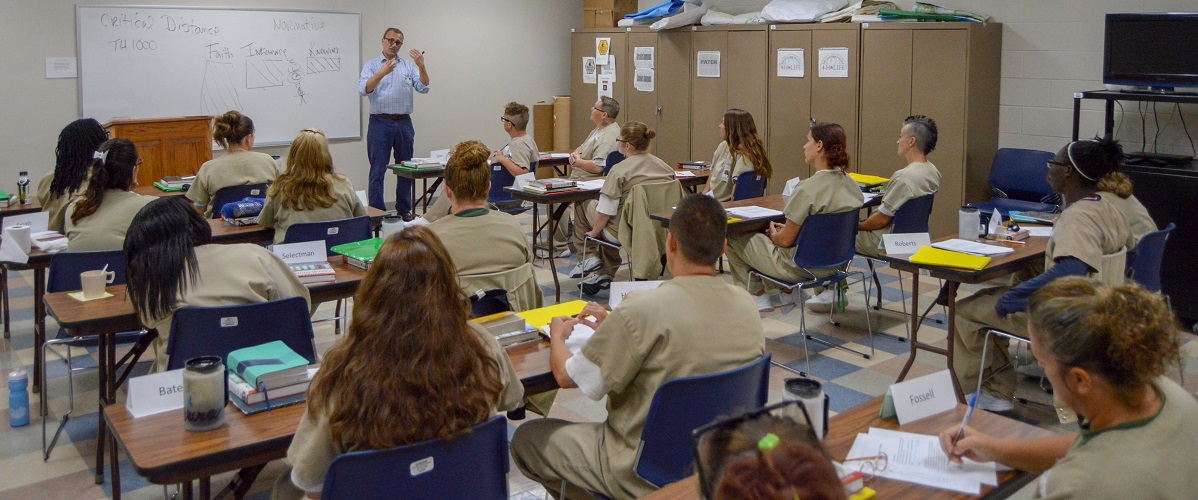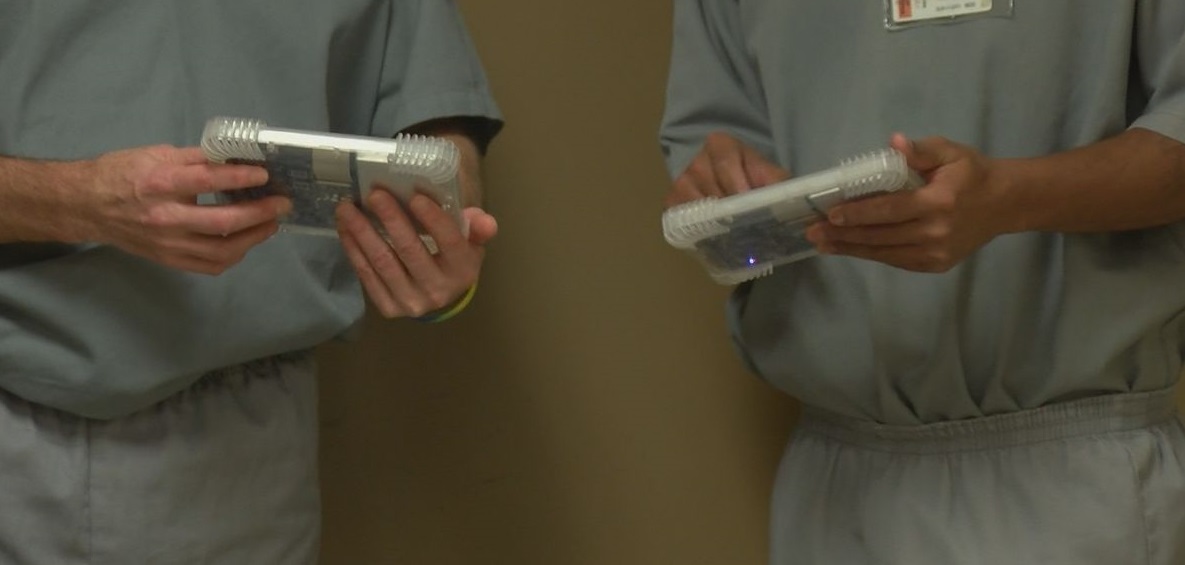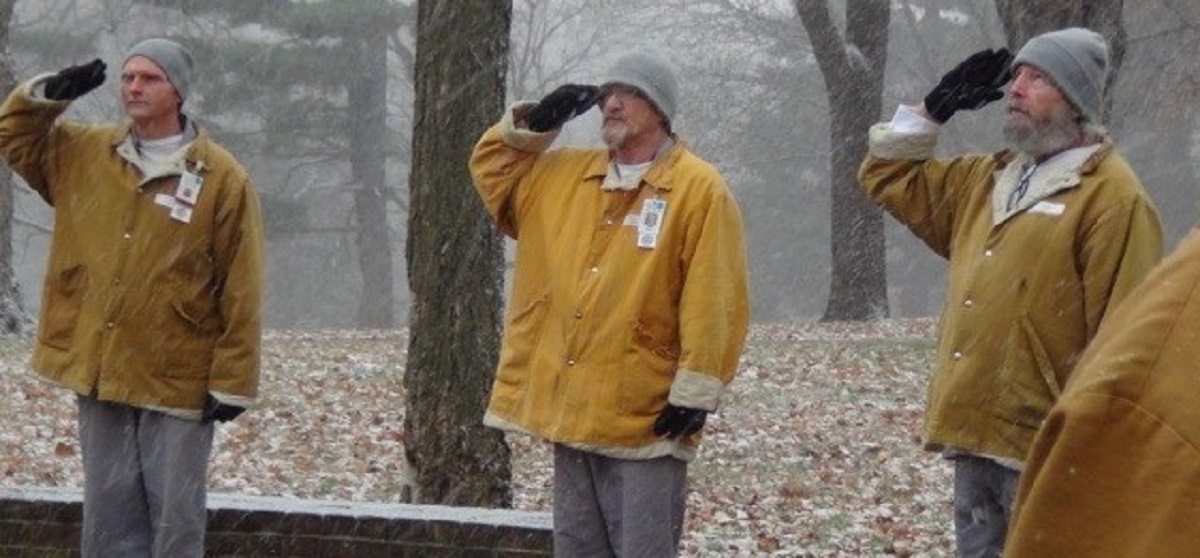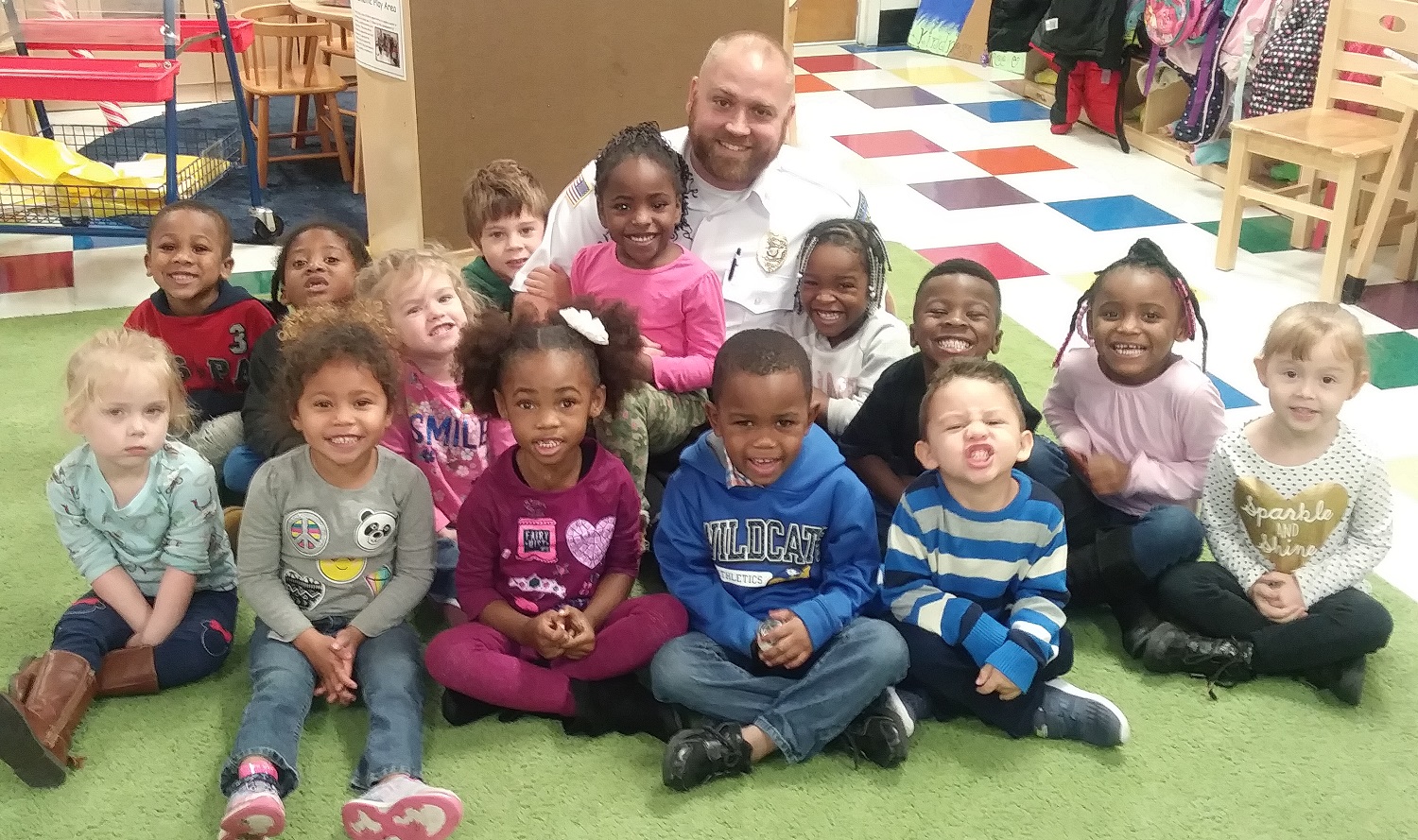The Missouri Department of Corrections had a challenging year, marked by staffing shortages and offender unrest. While tackling these issues, we launched new partnerships and education programs, reinvigorated staff training and team-building, and made serious progress in implementing a strategic plan to improve lives for a safer Missouri. Here are just a few things we accomplished in 2018:
-
We celebrated our superheroes.
When she saw smoke emanating from a neighbor’s apartment, Corrections Officer I Michelle Vogel ran into the burning building and saved a 4-year-old child. In recognition of her bravery, Governor Mike Parson awarded Vogel the state Medal of Valor. She also was one of a dozen employees to earn the Director’s Medal of Valor, and staff throughout the state earned the Lifesaver Award for heroic acts this year. On and off duty, our brave and quick-thinking employees rescued Missourians from fires, traffic accidents, choking, violent attacks, suicide attempts and medical emergencies. -
We mapped a way forward.
Armed with a strategic plan drafted in 2017, in 2018 we got to work on 70 initiatives designed to develop the workforce, improve workplace safety and reduce risk and recidivism in Missouri. By the end of 2018, 25 had been completed, 30 were in progress, and six were in charter status. Some highlights include staff recruitment and retention initiatives, new staff training programs and improved automation.
-
We fed a lot of Missourians.
Cultivating Restorative Justice Gardens in 19 Missouri prisons, in 2018, with staff supervision and support, offenders raised more than 87 tons of fresh produce for donation to food banks, senior centers, schools and other organizations — and generated positive energy in Missouri media. In 2019, the garden program will help the environment too. We’re partnering with the Missouri Department of Conservation to grow pollinator-friendly native plants on the grounds of our facilities. The plants support bees and butterflies essential to Missouri’s ecosystem; help to conserve water and other resources; and, with the aid of busy bees, improve the yield of vegetable crops, helping us feed more people in need.
-
We quit smoking.
In compliance with a 2017 court order, the department implemented a tobacco-free policy April 1, 2018. No tobacco products are allowed indoors or outdoors on the grounds of any facility, building or vehicle owned or leased by the Missouri Department of Corrections – with the exception of one outdoor designated smoking area for visitors and staff at each location. People working and living in our facilities now breathe cleaner air. Staff who want to quit tobacco or need assistance managing cravings can get help through the Missouri Consolidated Health Care Plan.
-
We managed major incidents without major injury.
The department experienced a disturbance on an unprecedented scale this year when a protest at Crossroads Correctional Center evolved into a riot lasting longer than six hours, placing employees and offenders in danger, and resulting in extensive structural and property damage. The swift, appropriate and professional response of facility staff prevented serious injury and loss of life. Building damage was substantial, and repairs took months to complete, resulting in prolonged periods of lockdown and limited movement for offenders. A second major disturbance at Tipton Correctional Center caused property damage inside a housing unit; no offenders or staff members were injured. -
We went to college.
Through a new partnership with Rockhurst University, staff at Chillicothe Correctional Center are taking free college courses taught by Rockhurst professors. Courses also are available to offenders, taught separately. Launched in summer 2018, the program offers weekly classes through which students can earn credits toward a degree. We also have formed a partnership with Ashland University of Ohio, through which offenders who qualify for Second Chance Pell Grants can take college courses using their tablets and staff can receive a discount on online courses. College programs also are available at Missouri Eastern Correctional Center and Eastern Reception, Diagnostic and Correctional Center through partnerships with Washington University and Saint Louis University.
-
We re-energized supervisors to build a better work culture.
In 2018, more than 2,000 MODOC supervisors completed The Corrections Way, a training program designed to transform our workplace culture by cultivating better communication and stronger relationships. Supervisors master skills in areas such as communication styles, effective feedback and conflict de-escalation to support a positive, productive, safe work environment. This year, all supervisors completed the first phase of training, and we began introducing the program to frontline staff. -
We had a puppy party.
This year the Puppies for Parole program reached a major milestone: 5,000 dog adoptions since its 2010 inception. Through P4P, offenders in correctional centers statewide train Missouri shelter dogs for adoption by families, veterans and anyone else with a forever home for a well-heeled pup. Joined by Royal Canin, the company that donates pet food to P4P, we celebrated in 2018 with demos, a ceremony and, of course, puppy-theme snacks made by Culinary Arts Program students. The guest of honor was dog number 5,000, Ellie, a floppy-eared coon hound. -
We trained Missourians for the state’s workforce and helped employers get the skilled labor they need.
In 2018, Missourians in our facilities earned 1,552 professional certifications, and 1,391 enrolled in career and tech programs. In 22 Missouri Vocational Enterprises factories inside 12 facilities, about 2,100 offenders developed job skills — a number we’re now expanding by 10 percent — and more than 400 are working on nationally recognized apprenticeships. In 2018 we launched new apprenticeships in horticulture, heavy equipment operation and wastewater management. In our work release program, offenders performed labor for state government agencies such as the Missouri Department of Transportation and the Department of Natural Resources in construction, landscaping and more. To connect skilled Missourians with employers, in 2018 we facilitated video job interviews. Preparing offenders for the workforce is a win-win-win situation for Missouri. Win for employers: trained and certified labor. Win for offenders' families: stability and income. Win for communities: safer Missouri. -
We designed new uniforms.
The Missouri Department of Corrections is introducing new uniforms for officers in all adult institutions in early 2019. Designed for comfort and performance, the uniforms pair adjustable-waistband cargo pants made from breathable, rip-stop fabric with performance-style raglan-sleeve shirts — black for Corrections Officer I and blue for supervisors. Velcro features make for easy laundering. Uniforms currently are being manufactured through Missouri Vocational Enterprises. Corrections officers and custody supervisors selected and voted on the uniform choices for their peers.
-
We helped taxpayers get a better return on investment.
Incarcerating one Missourian costs taxpayers $60 per day. Half of the people who enter prison are sentenced not for new crimes but for substance use treatment or technical parole violations. This perfect storm of circumstances catapulted Missouri to the nation’s eighth-highest incarceration rate. In 2017, comprehensive and eye-opening research by the Council of State Governments showed Missouri was on track to have to build two more prisons, at a cost of $485 million, in five years. To thwart that fate, in 2018 we drafted innovative legislation to change how we do business, which passed in the form of House Bill 1355. Known as the Justice Reinvestment bill, this set of initiatives aims to reduce crime, decrease the prison population and save taxpayers money. In December, a State Forum on Public Safety rallied statewide, multi-agency support for the plan. -
We launched partnerships to improve behavioral health and reduce recidivism.
Fueled by House Bill 1355, we launched a pilot program in Boone, Butler and Buchanan counties to help Missourians released from prison get behavioral health treatment and other services they need to avoid returning to prison. In the treatment pilot, people under community supervision work with teams made up of probation and parole officers; mental health service and substance use treatment providers; and organizations helping to locate resources such as transportation, child care, employment and housing. This process boosts success, stabilizes families and saves taxpayers money. With a grant from the Missouri Foundation for Health, we also partnered with the University of Missouri to develop, disseminate and test a curriculum of mental health training to help probation and parole officers understand issues faced by offenders with mental health concerns that can affect successful completion of probation or parole. -
We took big steps toward better situations for women.
Research conducted in 2017 by the Council of State Governments revealed that Missouri had the nation’s fastest-growing incarceration rate for women. It also showed women’s circumstances, risks, and mental health requirements differed dramatically from those of the male population. To better address women’s needs and help them stay out of prison, in 2018 we began implementing more gender-responsive practices and assessment tools. In early 2019, the Fulton Community Supervision Center will be converted into a women’s facility designed to serve women’s specific needs and boost their chances of success. This video by ARCHS highlights reentry services for women »
-
We went to the fair.
2018 marked the first year the department had a major presence at the Missouri State Fair. All week, staff members met Missourians at our booth in the Agriculture Building, where we showcased restorative justice gardens and a horticulture apprenticeship, served cookies made by the Culinary Arts Program, and recruited new members of the Department of Corrections Family.
-
We adopted modern technology.
To help make our work more effective and ensure offenders’ post-release success, we’ve started implementing a validated risk and needs assessment tool. The Ohio Risk Assessment System (ORAS) will help us make better decisions regarding program admissions, case management practices, community supervision levels and more. Another technological tool to boost offender success: JPay computer tablets. In other states, tablet programs have been shown to reduce assaults on staff by 60 percent and suicides by 100 percent. Provided at no cost to taxpayers or offenders, the tablets come with educational materials, e-books, music and secure monitored email (no internet access, no camera) as well as streamlined scheduling of case manager and health care provider appointments. Offenders with few or no conduct violations earn the privilege of buying games and movies.
-
We made our field offices safer.
To help ensure the well-being of officers providing community supervision, in 2018 we installed portal style metal detectors in 18 probation and parole offices and distributed more than 100 handheld metal detector wands to district, satellite and sub-offices. Periodically, clients and visitors have brought dangerous items such as guns, knives and other weapons into these offices. The new equipment provides an additional layer of physical security. -
We supported veterans.
On the heels of a resoundingly successful 2017 veterans program launch at Moberly Correctional Center, in 2018 we expanded veterans services to Algoa, Boonville and Potosi correctional centers. Offenders who have served in the United States military live together in a platoon-like system. They raise and lower the flag every day, assign and carry out work duties, complete treatment for post-traumatic stress and substance use together, and provide mentorship to peers. The program reduces conduct violations, boosts treatment efficacy and helps to improve the chances of success upon release. After release, veterans get more support from the new Probation & Parole veteran caseloads. The department also forged partnership with the military community to encourage people who have served their country to now serve their state as Missouri Department of Corrections employees.
-
We connected with our communities.
MODOC employees have big hearts. In 2018, staff members donated time and money to support dozens of organizations and programs, such as Special Olympics, Ronald McDonald House, Head Start, America’s Safe Schools Week, Shop With a Hero, Shop With a Cop and the Correctional Peace Officers Foundation. Staff held blood drives, volunteered at community festivals and Halloween events, and facilitated massive deliveries of school supplies and backpacks for kids, funded by offender donations. When we lost one of our own, staff came together to raise funds for his family. We're ready to make even more community connections in 2019.

